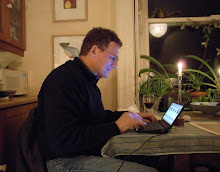
My new home in the mountains has an eastern view, and because I am a morning person, I've lately been musing about sunrises. I wondered why they seem to happen more quickly than sunsets. This led me to collect and to form some thoughts about sunrises and sunsets.
• Look, love, what envious streaks
Do lace the severing clouds in yonder east:
Night's candles are burnt out, and the jocund day
Stands tiptoe on the misty mountain tops. (Romeo and Juliet, III:v)
• At sunrise or sunset, sunlight takes a much longer path through the atmosphere than during the middle part of the day. Because an increased amount of violet and blue light is scattered out of the beam along the way, the light which reaches an observer early or late in the day is reddened. Thus, it could be said that sunsets are red because the daytime sky is blue.
(Stephen F.Corfidi, NOAA/NWS Storm Prediction Center)
• "...before the sun rises, the night sky above us is cold, since the sun hasn't heated it yet, whereas at the end of the day, the atmosphere has been heated by the sun. A hot atmosphere will cause the sun's rays to bend further, and thus we can still see the sun long after it has actually passed below the horizon. When the sun is rising, we don't see it until it actually rises above the eastern horizon." (anonymous web posting)
• Perhaps sunsets last longer because the dust in the atmosphere, which refracts the light, is being pulled after us into the night side of the planet. (TallTchr)
• Filmmakers call the hour before the sun starts to set "magic hour". The light has a warm, golden hue with no glare at all, and shadows are at their longest, giving the landscape a soft, dappled texture. This time is much prized for filming romantic scenes whose languor is in contrast to the off screen frenzy to wrap the scene before the window closes. (ibid)
J.M.W. Turner: Sunrise With Sea Monsters, 1845 (unfinished). Gertrude Stein, no fan of nature, once wrote that she'd rather look at a painting of a sunset by Turner than at an actual sunset. Possibly she meant that the artist can include the play of his imaginings, as he appears to be doing here. But I don't agree with Stein, and I'm not sure Turner would have, either, for I have imaginings, too, when I look at the sky and the sea, and I'd never want to be cut off from their source. By the way, Turner's last words were: "The sun is God."
Click on the picture for a closer look.

6 comments:
Yay Richard! Glad to see you are still blogging. Love your thoughts and observations on my favorite time of day. I've also heard cinematographers refer to magic hour as "sweet light" which I've always liked.
It's wonderful to be a morning person, witness gorgeous sunrises, feel the morning breeze, take refreshing walks in the mountains. To start early, with the Sun - makes the whole day better.
Enjoy your new home!
Early morning is my favorite time of day too. With the first rays of light come all possibilities.
Turner also particularly liked dawn - witness other masterpieces, Norham Castle: Sunrise, Sunrise between Headlands etc. www.jmwturner.org
Thank you, Dr. Whittingham, for the comment and the link. Good luck in sorting out the bequest, if it hasn't already been resolved.
Ann, Duta, and Paula, as always, thank you for your comments. I wonder if there's any research about the differences between morning people and night owls. Perhaps it conforms to the designations of Apollonian and Dionysian. After all, Apollo was the god of the sun.
Post a Comment